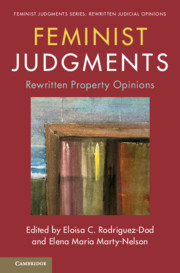Book contents
- Feminist Judgments: Rewritten Property Opinions
- Feminist Judgments Series
- Advisory Panel for Feminist Judgments Series
- Feminist Judgments: Rewritten Property Opinions
- Copyright page
- Dedication
- Contents
- Advisory Panel for Feminist Judgments: Rewritten Property Opinions
- Notes on Contributors
- Preface
- Acknowledgments
- About the Cover Art
- Part I Introduction
- 1 Introduction to Feminist Judgments: Rewritten Property Opinions
- 2 Property Law Revolution, Devolution, and Feminist Legal Theory
- 3 Incorporating Feminist Perspectives throughout Law School Curriculum
- Part II Allocation of Rights
- Part III Patents, Publicity Rights, and Trademarks
- Part IV Condemnation and Adverse Possession
- Part V Gifts and Future Interests
- Part VI Tenancy in Common, Joint Tenancy, and Tenancy by the Entirety
- Part VII Exclusionary Zoning
- Part VIII Evictions
- Part IX Landlord–Tenant Premises Liability
- Index
2 - Property Law Revolution, Devolution, and Feminist Legal Theory
from Part I - Introduction
Published online by Cambridge University Press: 21 October 2021
- Feminist Judgments: Rewritten Property Opinions
- Feminist Judgments Series
- Advisory Panel for Feminist Judgments Series
- Feminist Judgments: Rewritten Property Opinions
- Copyright page
- Dedication
- Contents
- Advisory Panel for Feminist Judgments: Rewritten Property Opinions
- Notes on Contributors
- Preface
- Acknowledgments
- About the Cover Art
- Part I Introduction
- 1 Introduction to Feminist Judgments: Rewritten Property Opinions
- 2 Property Law Revolution, Devolution, and Feminist Legal Theory
- 3 Incorporating Feminist Perspectives throughout Law School Curriculum
- Part II Allocation of Rights
- Part III Patents, Publicity Rights, and Trademarks
- Part IV Condemnation and Adverse Possession
- Part V Gifts and Future Interests
- Part VI Tenancy in Common, Joint Tenancy, and Tenancy by the Entirety
- Part VII Exclusionary Zoning
- Part VIII Evictions
- Part IX Landlord–Tenant Premises Liability
- Index
Summary
In the rewritten judgments that follow in this volume, authors envision alternatives to existing property cases. In their work, the authors query interpretations in both iconic, well-known property cases and some lesser known cases – for all the cases, in large and small ways, have shaped legal doctrine, processes, and practices. The authors premise their work on the notion that in many instances, judges, despite widely asserted notions of judicial constraint, have choices to make when deciding cases. The adoption of a feminist legal theory (and they are plural), that is, an explicitly feminist consciousness, is one of those choices, and it is a vitally important and necessary choice. Though feminist legal theories frequently promote change to existing legal norms, they do so not only for the sake of change but also to mediate legal, political, social, and economic barriers that limit women’s advancement.1 Moreover, feminist legal theories often confront the political and moral issues that all too often remain unaddressed, all while, within this silence, these issues work to narrow women’s possibilities. Participant authors in this project engage in exercises that are at once pointed and practical critiques of the law as it is, and also theoretical expositions of what the law could be.
- Type
- Chapter
- Information
- Feminist Judgments: Rewritten Property Opinions , pp. 10 - 18Publisher: Cambridge University PressPrint publication year: 2021

